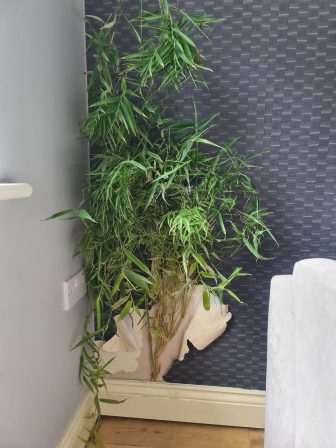 Homebuyers are unwittingly inheriting invasive bamboo infestations which are costing them thousands of pounds to remedy after they have moved in, according to Environet.
Homebuyers are unwittingly inheriting invasive bamboo infestations which are costing them thousands of pounds to remedy after they have moved in, according to Environet.
The invasive plant specialist is warning homebuyers to check properties thoroughly for any evidence of the plant and if it’s found, insist that sellers deal with the issue or renegotiate the sale price.
It is not a legal requirement for property sellers to declare bamboo on their property, as it is for Japanese knotweed, meaning there is no obvious legal recourse against a seller if it’s discovered post-sale. Homebuyers must rely on their own checks, and those carried out by their surveyor, to identify its presence and any evidence it may be spreading.
Approximately 8% of homes in the UK are currently directly affected by bamboo, comprising around 2 million dwellings, Environet says.
Data provided by the company indicates that bamboo is being flagged up more frequently on property surveys, as awareness grows of the damage it can cause, with a 50% annual increase in enquiries for bamboo removal relating to property transactions in the last six months compared to the same period last year. But many surveyors are still failing to identify the problem, leaving homebuyers to make the unwelcome discovery after they move in and foot the bill to remedy it.
YouGov research commissioned this year by Environet indicates that where people are aware of a bamboo problem on a property they want to buy, four fifths would take some kind of action. Nearly a quarter of people (24%) would walk away from a property altogether, while a third (32%) would insist the seller had it removed before the sale went ahead. A further 26% would opt to negotiate a discount on the property price to reflect the cost of having the plant professionally removed themselves, after they move in.
One of the most invasive plants in the UK, bamboo can spread quickly via long lateral rhizomes and emerge in new locations, where it can cause damage to lawns, paths, patios and homes. Due to the distance running varieties of bamboo can travel, up to 10 metres from the parent plant, it often encroaches into adjacent properties. If it is not dealt with and it causes damage, legal disputes can arise between neighbours.
Environet director, Emily Grant, said: “Nobody wants to inherit a stressful and expensive issue when they buy a property, but this is frequently happening with bamboo as there is no legal framework to protect buyers, as there is for Japanese knotweed.
“We’ve seen cases where clients have moved into their new home and they’ve barely unpacked before their new neighbour has knocked on the door asking what they’re going to do about the bamboo which is spreading onto their property.
“In our view, mature bamboo which is planted directly into the ground should be flagged on a property survey, recommending the buyer undertake further investigations to find out whether it’s spreading and what it would cost to remove. In addition to potential damage to their own property and garden, buyers need to consider the risk of a legal case from a neighbour if the bamboo encroaches into their property.”


Comments are closed.